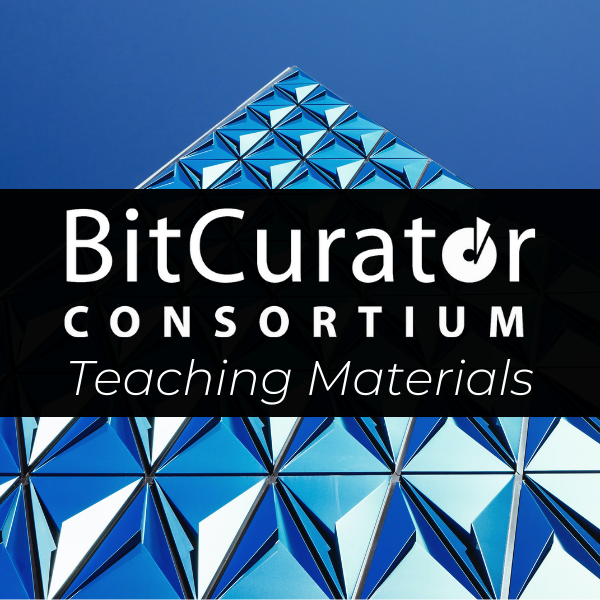BitCuratorEdu Curriculum Philosophy and Learning Objectives
Hannah Wang | BitCuratorEdu Project
BitCuratorEdu Curriculum Philosophy Statement
This statement was created by the BitCuratorEdu project and partners to direct our research and development of learning objects:
Digital curation is a broad, interdisciplinary field of scholarship and practice, which includes, among other areas, the application of digital forensics tools and methodologies when acquiring and processing born-digital materials. Teaching with the BitCurator Environment, a suite of open-source digital forensics and data analysis tools, not only builds capacity within the cultural heritage sector for working with digital materials, but is also an effective way to introduce students to informational structures and levels of representation of digital information, whether or not they intend to pursue a digital-focused career. The BitCuratorEdu curriculum aims to provide access to hands-on learning experiences and to offer an approach to these experiences that is grounded in digital curation scholarship. The goal of the curriculum is to produce competencies in when, why, and how to use digital forensics tools in the processing of born-digital materials to assure continued access and preservation.
BitCuratorEdu Learning Objectives
BitCuratorEdu learning objects provide support for instructors with the following learning objectives for their students:
Objective #1
Understand how to apply digital forensics tools and methods to born-digital materials.
- Determine the technical requirements and dependencies for installing open-source tools to process born-digital materials
- Practice using tools in the BitCurator Environment
- Design a born-digital archiving workflow
- Diagnose and troubleshoot issues that arise in born-digital archiving workflows
Objective #2
Determine when to use digital forensics tools and methods within born-digital processing workflows.
- Identify the appropriate tools to: safely acquire born-digital materials from storage media and other modes of transfer; assist in the appraisal of born-digital materials; scan for sensitive information in born-digital materials; and package born-digital materials for preservation and access
- Test and evaluate tools for use in born-digital archiving workflows
Objective #3
Comprehend why digital forensics tools and methods are used and the larger context around their implementation.
- Articulate the relationship between actions taken during acquisition and processing of born-digital materials and their long-term preservation and access
- Translate the major archival functions in traditional processing to their equivalent tools and methods in born-digital processing
- Differentiate between born-digital curation and digitization/digital projects
- Analyze the ethical considerations for tools and methods used in born-digital curation
- Advocate for the use of community-built and -supported open-source tools in digital curation
More learning objects
View all BitCuratorEdu Learning Objects
About this resource
This resource was released by the BitCuratorEdu project and is licensed under a Creative Commons Attribution 4.0 International License.
Most resources from the BitCuratorEdu project are intentionally left with basic formatting and without project branding. We encourage educators, practitioners, and students to adapt these materials as much as needed and share them widely.
The BitCuratorEdu project was an effort (2018-2022) funded by the Institute of Museum and Library Services (IMLS) to study and advance the adoption of digital forensics tools and methods in libraries and archives through professional education efforts. This project was a partnership between Educopia Institute and the School of Information and Library Science at the University of North Carolina at Chapel Hill, along with the Council of State Archivists (CoSA) and several Masters-level programs in library and information science.

Hannah Wang. (June 20, 2022). BitCuratorEdu Curriculum Philosophy and Learning Objectives. BitCuratorEdu Project.